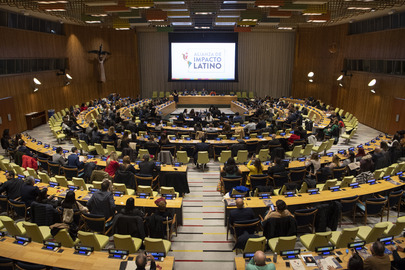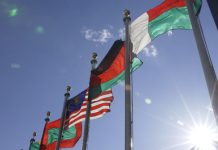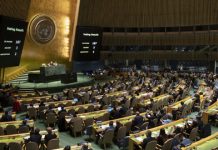This is the News in Brief from the United Nations.
Gaza today: Scorching heat, dire aid shortages and heavy fighting
Desperate shortages of essentials in Gaza have left the enclave’s most vulnerable individuals struggling to fend for themselves amid stifling heat, heavy fighting, disease spread and a breakdown in law and order.
That’s the latest assessment of the dire situation in Gaza from the UN aid coordination office, OCHA and the UN World Food Programme, WFP.
They expressed deep concerns for all those in Gaza and particularly those in the south, who are now crammed into a narrow area along the beach “in the burning summer heat” and facing a “public health and protection disaster”.
“Active conflict and lawlessness” have made it “near-impossible” for aid teams to meet soaring needs, the UN humanitarians said, with ground incursions and heavy fighting reported in Beit Hanoun, south of Gaza city, eastern Deir al Balah, northeastern Khan Younis, and central and southern Rafah.
Among the alarming shortages facing Gazans, OCHA, highlighted a lack of milk and formula for babies, along with nutritional supplements for children, and pregnant and breastfeeding women.
It said that “despite visible signs of wasting among children, no nutrition screenings have been conducted to assess the scale of malnutrition and treat identified cases, due to limited capacity”.
OCHA also reported that emergency deliveries continue to take place in tents with no medical support at some displacement sites that are operating “only a few hours a day” without an adequate supply of medicines.
Don’t forget Sudan crisis on World Refugee Day, says UNHCR chief
As Sudan’s rival militaries continue to clash in North Darfur’s El Fasher city and elsewhere, the UN refugee agency – UNHCR – appealed for greater global support for the more than nine million people uprooted since violence erupted more than a year ago.
Over 700,000 people have now fled into South Sudan, and it’s from there that UNHCR chief Filippo Grandi issued an appeal to coincide with World Refugee Day, marked on 20 June:
“I’m here during the week of World Refugee Day to say don’t forget the refugees from Sudan. Don’t forget the neighbouring countries Chad, Central African Republic, South Sudan, Ethiopia, Egypt that are all generously receiving people but that are facing challenges of their own. Here in South Sudan, a country that has seen two civil wars in ten years and which is still emerging from this conflict, this crisis, this arrival of hundreds of thousands of returnees, could be very destabilising.”
A significant number of those affected by the war in Sudan are Eritrean refugees; their plight was highlighted in the Human Rights Council on Thursday by independent rights expert and Special Rapporteur on Eritrea Mohamed Babiker.
He told Member States that the conflict in Sudan had caused internal displacement as well as onwards displacement of Eritrean refugees and asylum-seekers.
The Special Rapporteur also noted that Eritrean refugees and migrant women and girls have been “subjected to grave violations in Khartoum and in areas controlled by Sudan’s Rapid Support Forces (RSF), including sexual violence, kidnapping, domestic servitude and sexual slavery”.
Worldwide, more than 120 million people have been forced from their homes including 43.5 million who have fled across national borders, the UN Secretary-General said in his message for World Refugee Day.
Foreign direct investment declines for second year, UNCTAD report shows
Finance for critical international projects that’s known as foreign direct investment – or FDI – declined by two per cent in 2023, totalling $1.3 trillion, amid increasing trade and geopolitical tensions and concerns over “greenwashing”, according to the UN trade and development agency UNCTAD.
FDI is crucial for funding infrastructure and public services such as power and renewable energy, but UNCTAD said that tight financing conditions in 2023 led to a 25 per cent drop in the number of FDI deals.
This triggered a 10 per cent slowdown in investment in sectors linked to the Sustainable Development Goals – or SDGs – most notably in agrifood systems, water and sanitation.
These sectors registered fewer internationally financed projects in 2023 than in 2015, that was when all countries signed up to the SDGs and agreed to deliver on them by 2030.
Developing countries have been hit hardest, according to UNCTAD, which noted only marginal growth in sustainable bonds last year and a 60 per cent drop in financing for funds supporting them.
UNCTAD also warned that investment in the sustainability sector has been increasingly affected by concerns about “misleading” claims and “greenwashing”, which in turn has led to calls for more checks and balances to reassure investors.
Daniel Johnson, UN News
Source of original article: United Nations (news.un.org). Photo credit: UN. The content of this article does not necessarily reflect the views or opinion of Global Diaspora News (www.globaldiasporanews.com).
To submit your press release: (https://www.globaldiasporanews.com/pr).
To advertise on Global Diaspora News: (www.globaldiasporanews.com/ads).
Sign up to Global Diaspora News newsletter (https://www.globaldiasporanews.com/newsletter/) to start receiving updates and opportunities directly in your email inbox for free.






























